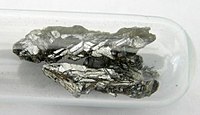
Photo from wikipedia
Despite (repeated) boostering, kidney transplant recipients (KTR) may remain at increased risk of severe COVID-19 since a substantial amount of individuals remain seronegative or with low antibody titers. In particular,… Click to show full abstract
Despite (repeated) boostering, kidney transplant recipients (KTR) may remain at increased risk of severe COVID-19 since a substantial amount of individuals remain seronegative or with low antibody titers. In particular, mycophenolic acid (MPA) use has been shown to affect antibody formation negatively and may be an important modifiable risk factor. We investigated the exposure-response relationship between MPA area-under-the-curve0-12h (AUC0-12h ) exposure and seroconversion including antibody titers after vaccination using mRNA-1273 SARS-CoV-2 vaccine (Moderna) in 316 KTR from our center that participated in the national Dutch RECOVAC LESS CoV-2 vaccination study. After two vaccination doses, 162 (51%) KTR seroconverted. KTR treated with MPA showed less seroconversion and lower antibody titers compared to KTR without MPA (44% vs. 77%, and 36BAU/mL vs. 340BAU/mL; p<0.001). The mean MPA-AUC0-12h exposure was significantly lower in KTR who seroconverted compared to KTR who did not (39 vs. 29mg*h/L; p<0.001). High MPA exposure (± 90mg*h/L) and no exposure to MPA resulted in a seroconversion rate ranging from 10%-80%. Every 10mg*h/L increase in MPA-AUC0-12h gave an adjusted odds ratio for seroconversion of 0.87 (95% CI: 0.79-0.97; p=0.010) and 0.89 (95% CI: 0.85-0.93; p<0.001) for KTR on dual and triple maintenance immunosuppressive therapy, respectively. Higher MPA-AUC0-12h correlated with lower antibody titers (R-0.44,p<0.001). This study demonstrates the exposure-response relationship between gold standard MPA exposure and antibody formation to support interventional studies investigating MPA adjustment to improve antibody formation after further boostering.
Journal Title: Clinical pharmacology and therapeutics
Year Published: 2023
Link to full text (if available)
Share on Social Media: Sign Up to like & get
recommendations!